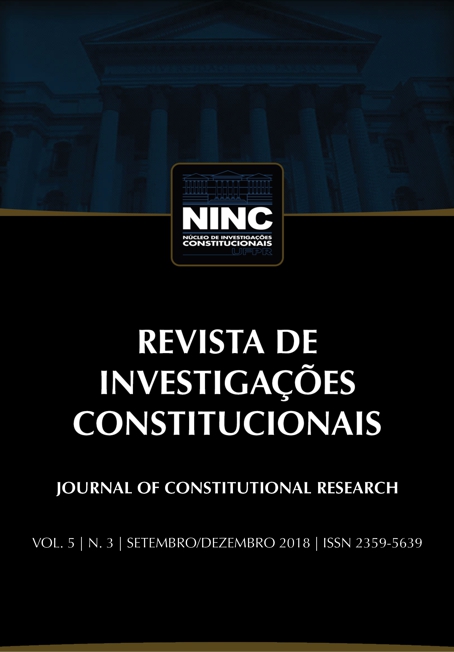Constitutionalizing umbrella-concepts: peace and conflict in the Brazilian Constitution
DOI:
https://doi.org/10.5380/rinc.v5i3.60938Palavras-chave:
peace, reconceptualization, conflict, Galtung, constitutionalization, Brazilian Constitution.Resumo
The incorporation of the concept of peace as an umbrella concept within the Brazilian Constitution has generated conceptual problems. This is demonstrated by attempts to understand the scope and limits of peace and conflict established by the Brazilian Constitution. The purpose of this study is to explore the concepts of peace and conflict, in order to clarify the meanings to which the Constitution refers, and to overcome the umbrella concept. For this, articles 4.6 and 4.7 of the Constitution were analyzed, in light of Galtung’s theory of peace and conflict and Brazil's foreign policy from 1988 onwards.
Referências
GALTUNG, Johan. A theory of conflict. Hawaii: University of Hawaii, 1973.
GALTUNG, Johan. A theory of peace. Oslo: Transcend University Press, 1967.
GALTUNG, Johan. Peace by peaceful means. Oslo: Prio, 2012.
JAPAN. Constitution of Japan. 3 November 1946. Available at: <http://www.japaneselawtranslation.go.jp/law/detail_main?re=&vm=02&id=174>. Accessed on 14 July 2018.
JAPAN. Japan’s Security / Peace & Stability of the International Community. 2018. Available at: <http://www.mofa.go.jp/policy/security/index.html>. Accessed on 14 July 2018.
JAPAN. National Security Strategy of Japan. 2018. Available at: <https://www.cas.go.jp/jp/siryou/131217anzenhoshou/pamphlet_en.pdf>. Accessed on 14 July 2018.
UN Security Council, Security Council resolution 1559 (2004) [on the political independence and withdrawal of foreign forces from Lebanon], 2 September 2004, S/RES/1559 (2004), available at: <http://www.refworld.org/docid/41516a7e4.html>. Accessed on 14 July 2018.
UN Security Council, Security Council resolution 1593 (2005) [on Violations of International Humanitarian Law and Human Rights Law in Darfur, Sudan], 31 March 2005, S/RES/1593 (2005). Accessed on 14 July 2018.
UN Security Council, Security Council resolution 1929 (2010) [on measures against Iran in connection with its enrichment-related and reprocessing activities, including research and development], 9 June 2010, S/RES/1929 (2010), available at: <http://www.refworld.org/docid/4c1f2eb32.html>. Accessed on 14 July 2018.
UN Security Council, Security Council resolution 1973 (2011) [on the situation in the Libyan Arab Jamahiriya], 17 March 2011, S/RES/1973 (2011), available at: <http://www.refworld.org/docid/4d885fc42.html>. Accessed on 14 July 2018.
UN Security Council, Security Council resolution 929 (1994) [UN Assistance Mission for Rwanda], 22 June 1994, S/RES/929 (1994), available at: <https://documents-dds-ny.un.org/doc/UNDOC/GEN/N94/260/27/PDF/N9426027.pdf?OpenElement>. Accessed on 14 July 2018.
UN Security Council, Security Council resolution 940 (1994) [UN Mission in Haiti], 31 July 1994, S/RES/940 (1994), available at: <http://unscr.com/en/resolutions/doc/940>. Accessed on 14 July 2018.
UN Security Council, Security Council resolution 944 (1994) [Haiti], 29 September 1994, S/RES/944 (1994), available at: <https://www.sipri.org/sites/default/files/2016-03/944.pdf>. Accessed on 14 July 2018.
UN Security Council, Security Council resolution 964 (1994) [UN Mission in Haiti], 29 November 1994, S/RES/964 (1994), available at: <http://unscr.com/en/resolutions/doc/964>. Accessed on 14 July 2018.
Downloads
Publicado
Como Citar
Edição
Seção
Licença
Autores que publicam nesta revista concordam com os seguintes termos:- Autores mantém os direitos autorais e concedem à revista o direito de primeira publicação, com o trabalho simultaneamente licenciado sob a Creative Commons - Atribuição 4.0 Internacional que permite o compartilhamento do trabalho com reconhecimento da autoria e publicação inicial nesta revista.
- Autores têm autorização para assumir contratos adicionais separadamente, para distribuição não-exclusiva da versão do trabalho publicada nesta revista (ex.: publicar em repositório institucional ou como capítulo de livro), com reconhecimento de autoria e publicação inicial nesta revista.
- Autores têm permissão e são estimulados a publicar e distribuir seu trabalho online (ex.: em repositórios institucionais ou na sua página pessoal) a qualquer ponto antes ou durante o processo editorial, já que isso pode gerar alterações produtivas, bem como aumentar o impacto e a citação do trabalho publicado (Veja O Efeito do Acesso Livre).
























